- Webinars
- Classes
- Labs
- RB's Top Picks
- Amanda's Top 10
- Trending
- Acting
- All Education
- Animation
- Breaking in
- Cinematography
- Composing
- Crew
- Directing
- Filmmaking
- Financing
- Legal
- Marketing
- Masters of Craft
- Networking
- On-Set Production
- Packaging & Distribution
- Producing
- Representation
- Screenwriting
- Television
- Voice Acting
- Explore All
The Worldwide Leader in Entertainment Industry Education.
Watch over 3,000 hours.
Webinar

$49.00
$39.20
Jun 24th, 1:00 PM PDT
Sale ends 6/19
Taught By: Liliana Granados
Writing with Authenticity: How to Develop a Distinct Voice in Your Script
Webinar

$49.00
$39.20
Jun 26th, 1:00 PM PDT
Sale ends 6/21
Taught By: Pia Chikiamco
How to Pitch an Animated Series to Networks or Streamers
Webinar

$49.00
$39.20
Jun 30th, 1:00 PM PDT
Sale ends 6/25
Taught By: Karina Wilson
How to Write the Perfect Plot Twist: Thriller Screenwriting Essentials
Webinar

Free
ON DEMAND
Taught By: Emma Louise Smith
30 Minutes with Emma Louise Smith
Webinar

$49.00
ON DEMAND
Taught By: Charlie Osowik
How to Pick Comps to Describe Your Script
Webinar

$49.00
ON DEMAND
Taught By: James Kicklighter
What To Do With Your Short Film When You've Exhausted Film Festivals
Webinar

Free
ON DEMAND
Taught By: Michael Wormser (P.G.A. Member) (Educator)
30 Minutes with Producer Michael Wormser
Webinar

$49.00
ON DEMAND
Taught By: Anna Henry, TV Executive (Educator)
Why They Passed: Understanding Industry Feedback
Class

$399.00
$299.00
Jul 7th, 3:00 PM PDT
Sale ends 6/24
Taught By: Sean Flanagan
4-Part Class: Smart Film Finance - Matching Your Film's Budget to Distribution Opportunities
Class

$399.00
ON DEMAND
Taught By: Viviana Zarragoitia
4-Part Class: Private Equity, Debt, Bridge & Gap Financing
Class

$399.00
ON DEMAND
Taught By: Eben Davidson
4 Part Producing Class: Introduction to Development Pre-Production & Production
Class

$399.00
ON DEMAND
Taught By: Christopher Lockhart
4-Part Class: How to Prepare your 60 Second, 2 Minute, 5 Minute and 10+ Minute Feature Film Pitch
Class

$129.00
ON DEMAND
Taught By: Joshua Young
Stage 32 2-Part Class: Advanced Level ChatGPT Prompts for Project Research
Class

$99.00
ON DEMAND
Taught By: Carmen Cabana
2-Part Class: Cinematographers: How to Prepare & What to Expect On Set
Class

$129.00
ON DEMAND
Taught By: Ryan Cartwright
Stage 32 4 Hour Acting Intensive Workshop: Develop Your Audition Process for 2025 to Book More Work
Class

$199.00
ON DEMAND
Taught By: Jeff Nemon
2-Part Class: How to Attach a Showrunner to your TV Project
Lab

$699.00
Jun 22nd, 9:00 AM PDT
Taught By: Emma Louise Smith
Stage 32 Finance Lab: Crafting a Financial Investor Prospectus for Your $2-$5MM Feature Film (June 2025)
Lab

$1199.00
Jun 22nd, 9:00 AM PDT
Taught By: Thomas Pemberton
Stage 32 Screenwriting Lab: Write Your Feature Screenplay in 12 Weeks with Expert Guidance from a Global Executive (June 2025)
Lab

$799.00
Jul 26th, 10:00 AM PDT
Taught By: Spencer Robinson
Stage 32 Screenwriting Lab: Write a Drama TV Pilot in 8 Weeks - From Concept to Completed Script (July 2025)
Lab

$599.00
Jul 27th, 9:00 AM PDT
Taught By: Jeanette B. Milio
6 Part Advanced Film Finance Lab: Finance & Profitability Intensive with Business Pitch Workshop (July 2025)
Lab

$399.00
$299.00
Aug 3rd, 10:00 AM PDT
Sale ends 7/1
Taught By: Heath Cullens
Fundamentals of Directing: From Visualization to Post-Production – 4 Part Class (August 2025)
Webinar
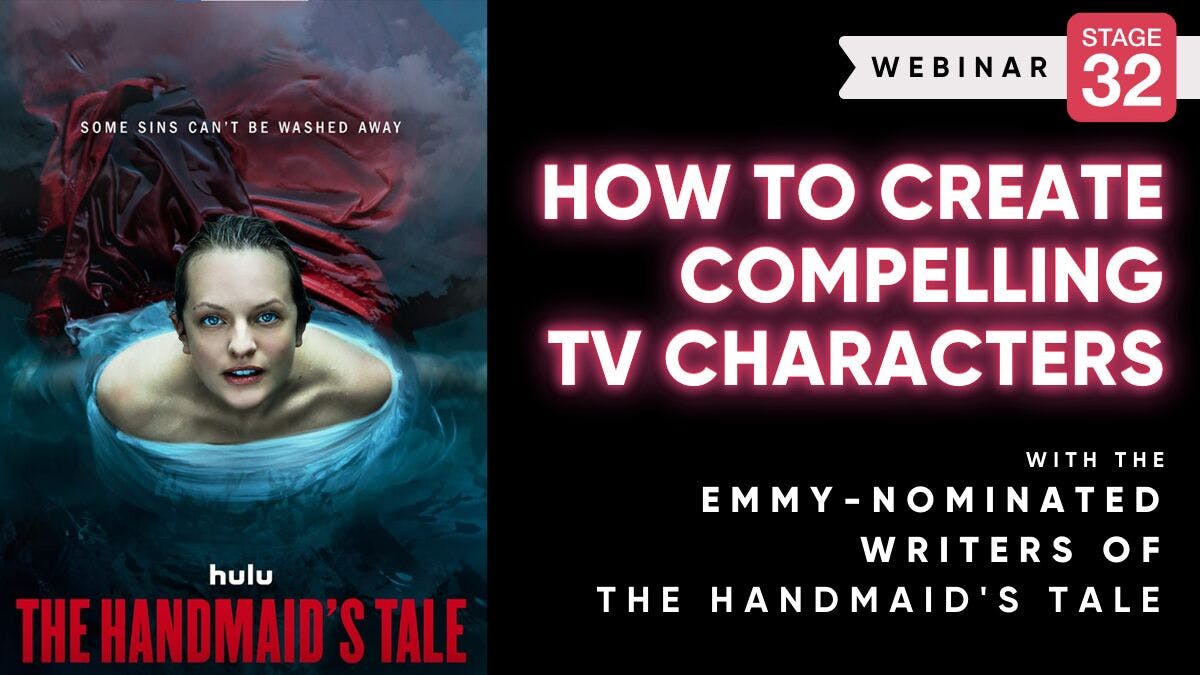
$49.00
ON DEMAND
Taught By: Nina Fiore & John Herrera
How to Create Compelling TV Characters with the Emmy-Nominated Writers of "The Handmaid's Tale" + Get a Copy of the Pilot Script
Webinar
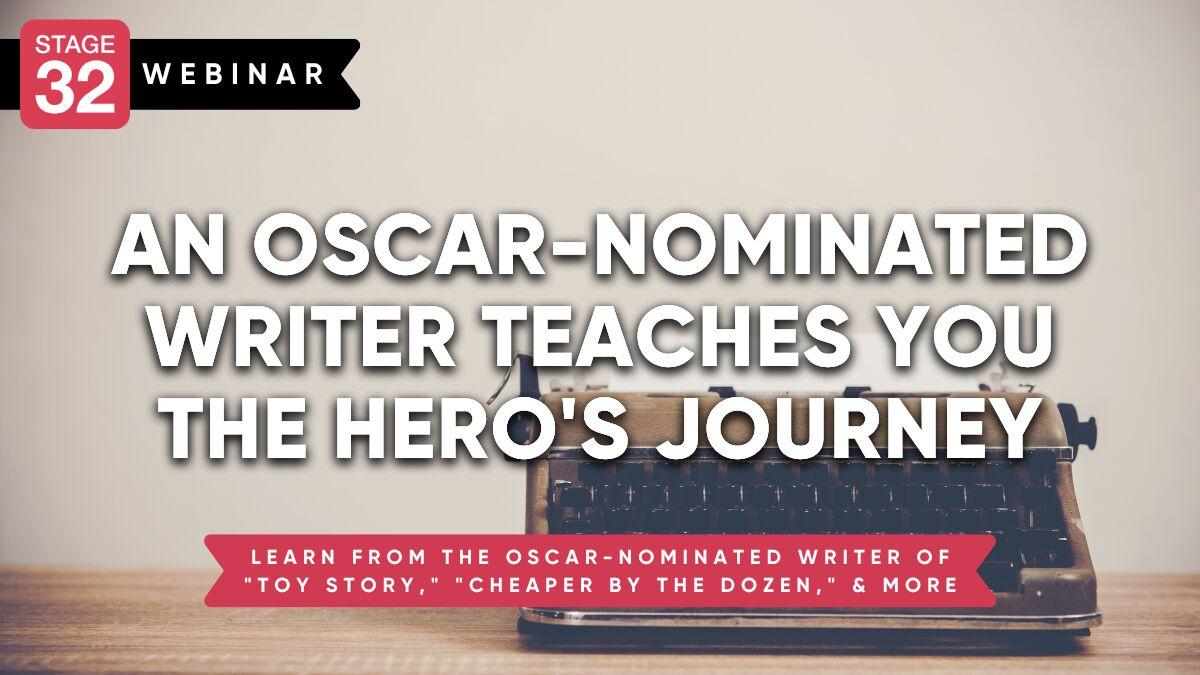
$49.00
ON DEMAND
Taught By: Alec Sokolow
An Oscar-Nominated Writer Teaches You The Hero's Journey
Class

$399.00
ON DEMAND
Taught By: Brian Herskowitz
4-Part Class: Fundamentals of Screenwriting - Story Structure from Concept to Outline
Webinar

$49.00
ON DEMAND
Taught By: Michelle Alexandria
3 Key Steps To Build Your Film Package & Attract Financing
Webinar
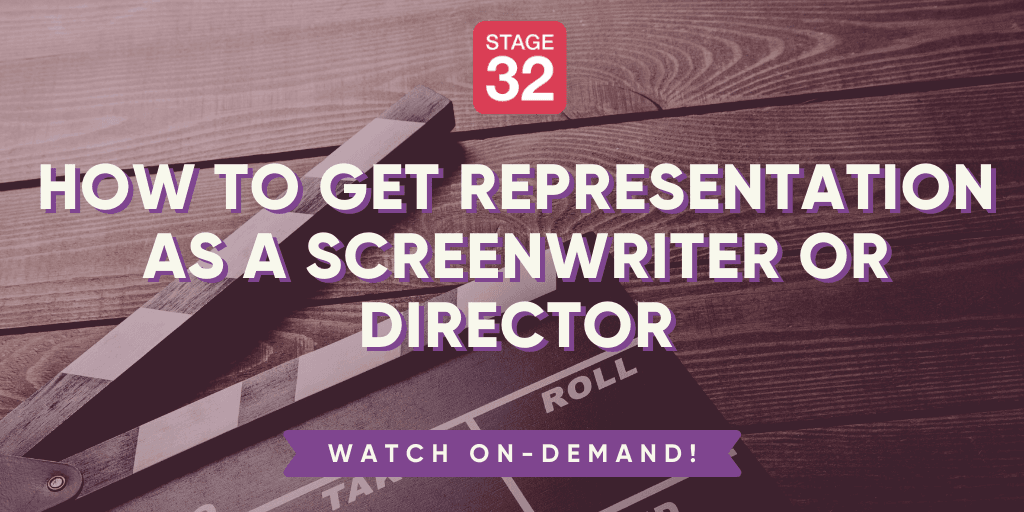
$49.00
ON DEMAND
Taught By: Antonio D'Intino
How to Get Representation as a Screenwriter or Director
Webinar
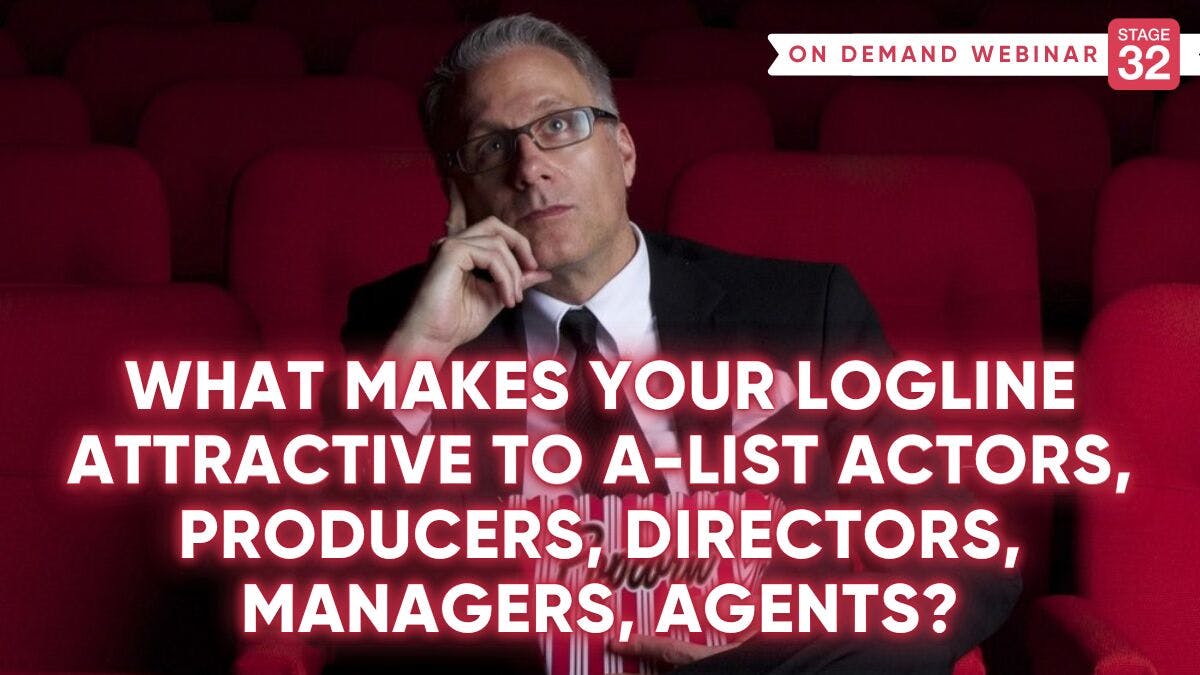
$49.00
ON DEMAND
Taught By: Christopher Lockhart
What Makes Your Logline Attractive to A-List Actors, Producers, Directors, Managers, Agents, Financiers and Development Execs?
Webinar

$49.00
ON DEMAND
Taught By: Anna Henry
How to Write a Professional TV Pitch Document / Treatment - with Downloads
Webinar

$49.00
ON DEMAND
Taught By: Jaia Thomas
Avoid Theft: How To Legally Protect Your Script, Idea or Project
Webinar

$49.00
ON DEMAND
Taught By: Jeff Nemon
How To Sell Your Series To A Streamer Or Network In Today's Market
Webinar

$49.00
ON DEMAND
Taught By: Anna Henry
How To Write Your TV Pitch Bible To Sell Your Show
Webinar
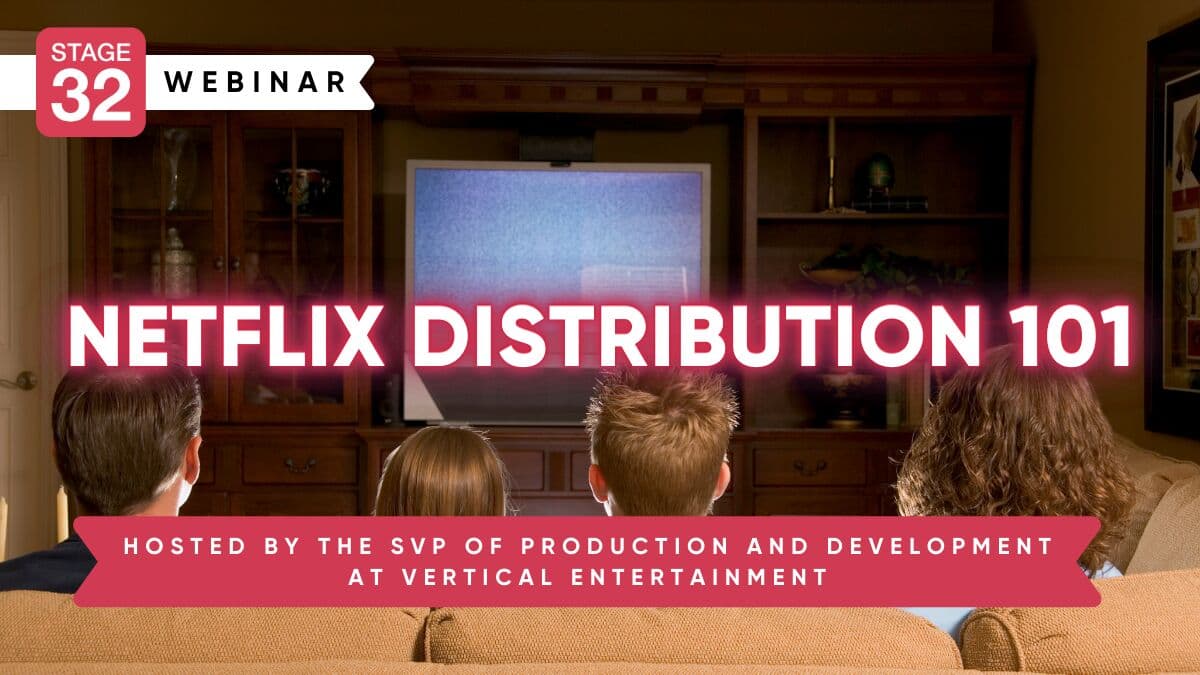
$49.00
ON DEMAND
Taught By: Kristin Harris
Netflix Distribution 101
Class

$399.00
ON DEMAND
Taught By: Michelle Alexandria
How You Can Build a Film Package For Little to No Budget
Webinar

$49.00
ON DEMAND
Taught By: Jay Glazer
Actors: How to Land a Breakthrough Role and Get to the Next Level In Your Career
Webinar

$49.00
ON DEMAND
Taught By: Thomas A. Crowell, Esq.
Your Definitive Legal Guide to Shopping, Option and Attachment Agreements - With an In Depth 32-Page Resource Sheet
Webinar

$49.00
ON DEMAND
Taught By: Christopher Lockhart
What Makes Your Logline Attractive to A-List Actors, Producers, Directors, Managers, Agents, Financiers and Development Execs?
Webinar
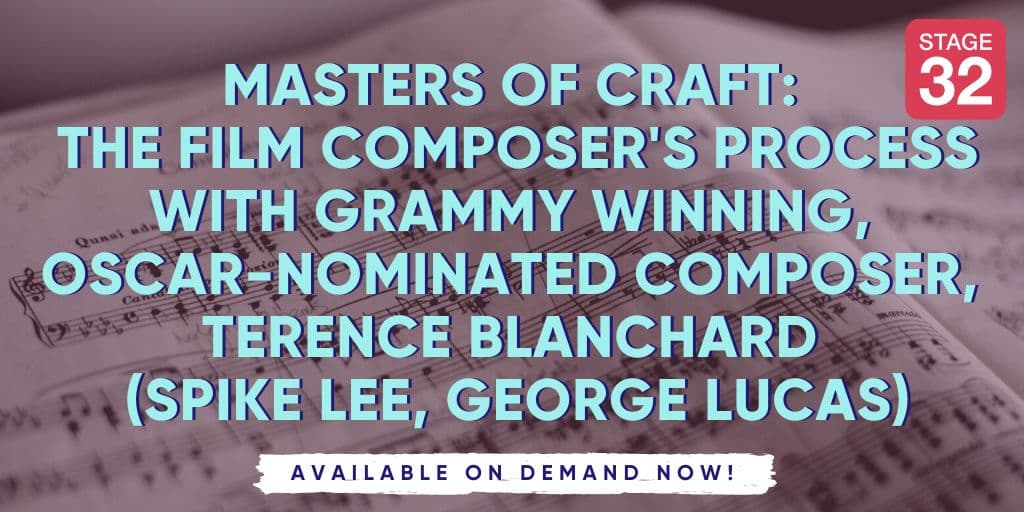
$49.00
ON DEMAND
Taught By: Terence Blanchard
Masters of Craft: The Film Composer's Process With Grammy Winning, Oscar Nominated Composer, Terence Blanchard (Spike Lee, George Lucas)
Webinar

$49.00
ON DEMAND
Taught By: Emma Louise Smith
How To Create A Compelling Investment Proposal That Attracts Financing For Your Project
Webinar

$49.00
ON DEMAND
Taught By: Jeff Nemon
How To Sell Your Series To A Streamer Or Network In Today's Market
Webinar

$49.00
ON DEMAND
Taught By: Spencer Robinson
How To Use A, B & C Story Lines In Your Pilot Script
Webinar

$49.00
ON DEMAND
Taught By: Bradley Gallo
How To Approach And Attach A-List Talent To Your Film + Sample Offer Letter
Class
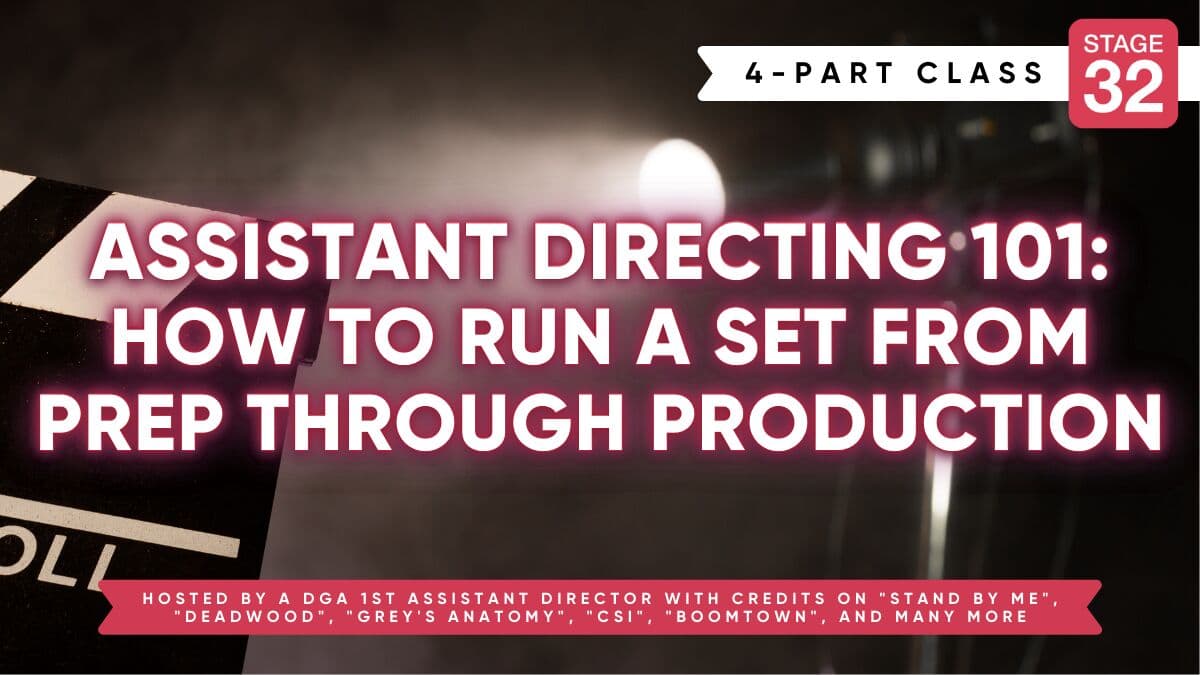
$399.00
ON DEMAND
Taught By: Korey Pollard
Assistant Directing 101: How To Run A Set From Prep Through Production
Webinar
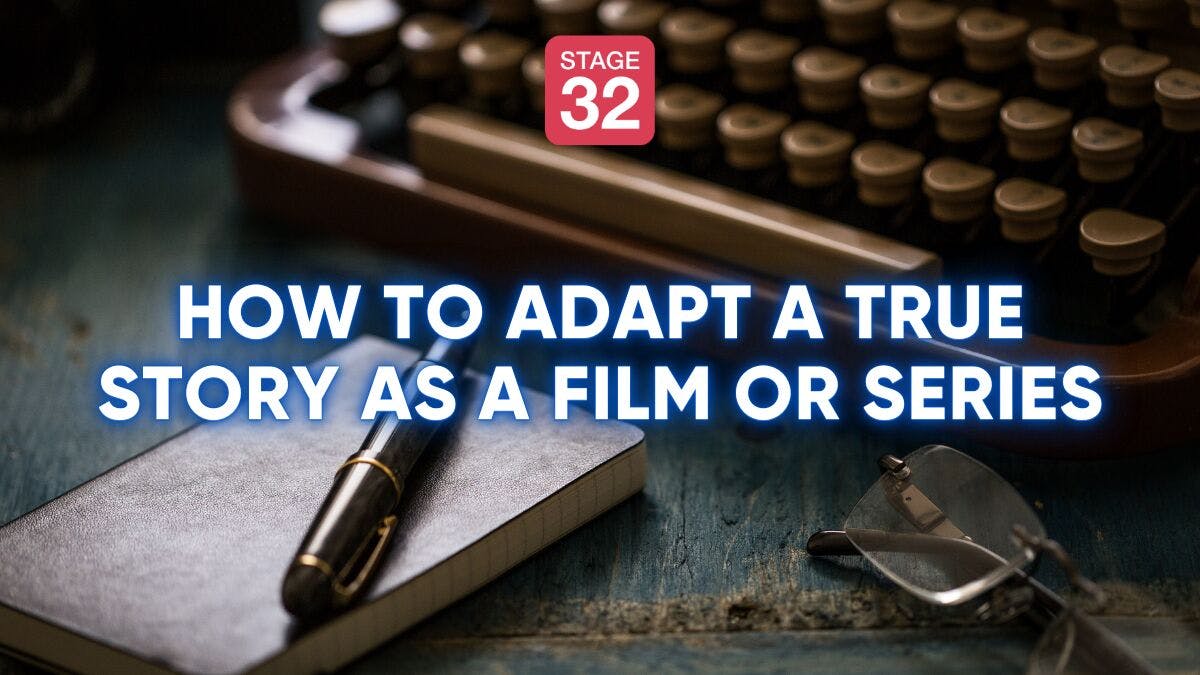
$49.00
ON DEMAND
Taught By: Kate Sharp
How to Adapt a True Story as a Film or Series
Webinar

$49.00
ON DEMAND
Taught By: Michael Mandaville
How to Start a Career in Line Producing
Webinar

$49.00
ON DEMAND
Taught By: Jay Glazer
How to Get Pitch Meetings For Your Project
Class

$129.00
ON DEMAND
Taught By: Ryan Cartwright
Stage 32 4 Hour Acting Intensive Workshop: Develop Your Audition Process for 2025 to Book More Work
Class

$399.00
ON DEMAND
Taught By: Brian Herskowitz
Stage 32 4-Part Class: Heroes & Villains: How To Write Protagonists and Antagonists That Leap Off The Page
Class

$399.00
ON DEMAND
Taught By: Jeff Nemon
Stage 32 4-Part Class: How to Sell Your TV Series to a Streamer or Network - From Pitch to Screen
Webinar

$49.00
ON DEMAND
Taught By: Charlie Osowik
Breaking Down the 3-Act Structure in Your Feature Film Screenplay
Webinar

$49.00
ON DEMAND
Taught By: Jon Sperry
How to Master Regional English Dialects and Reduce Your Accent to Get More Jobs
Class
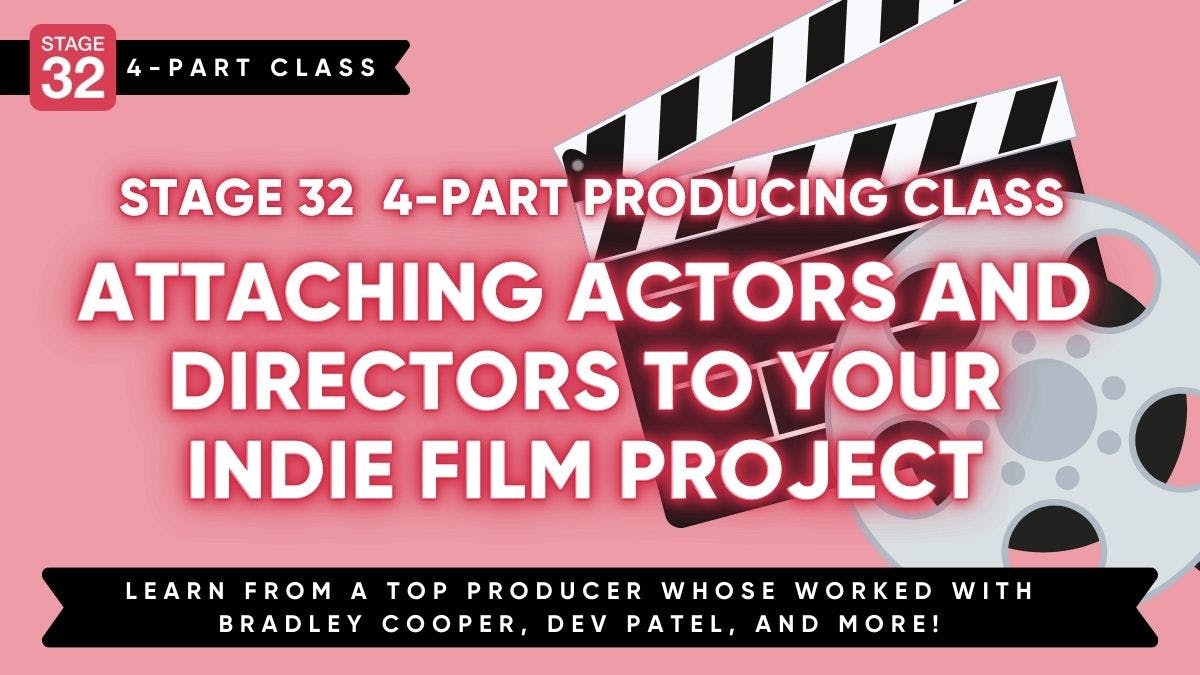
$399.00
ON DEMAND
Taught By: Jim Young
Stage 32 4-Part Producing Class: Attaching Actors and Directors to Your Indie Film Project
Webinar
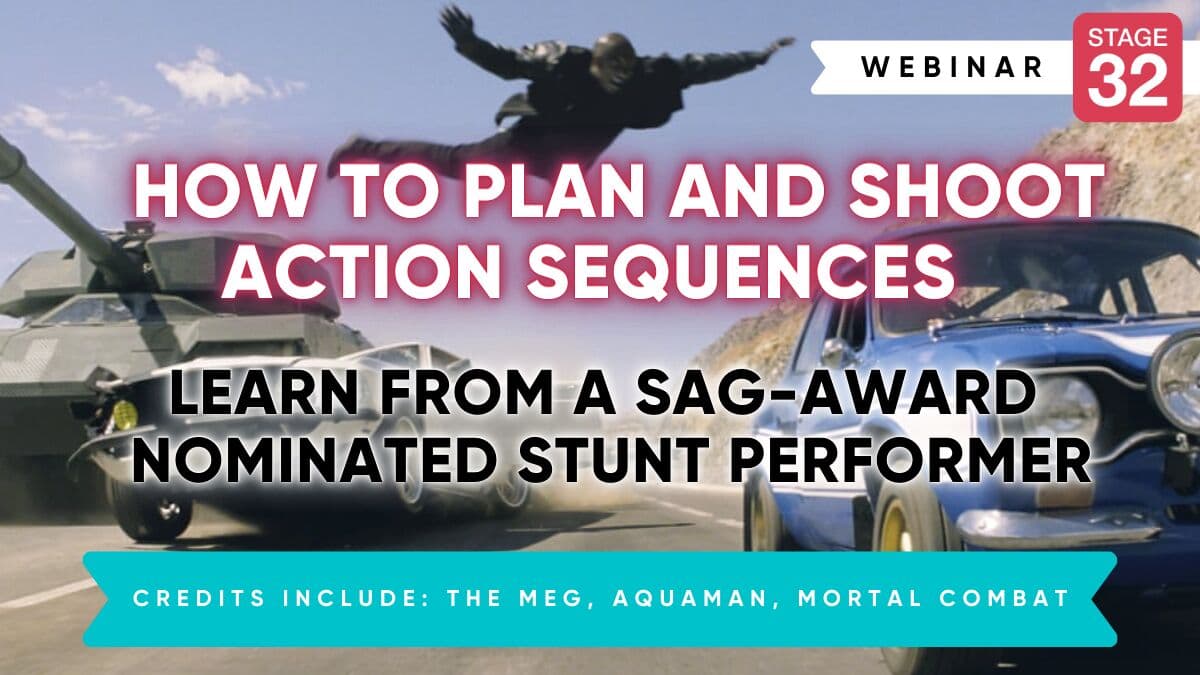
$49.00
ON DEMAND
Taught By: Philippe Deseck
How to Plan and Shoot Action Sequences - Learn From a SAG Award -Nominated Stunt Performer (THE MEG, AQUAMAN)
Webinar
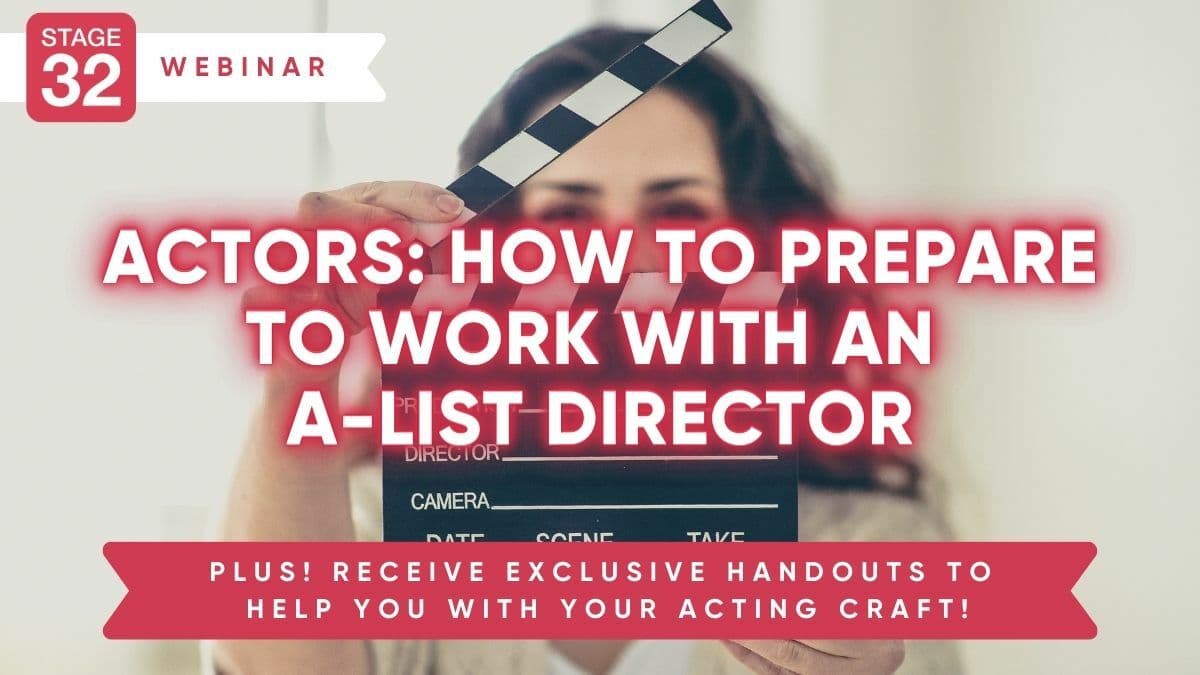
$49.00
ON DEMAND
Taught By: Alessandro Fiorucci
Actors: How To Prepare To Work With An A-List Director
Webinar

$49.00
$39.20
Jun 24th, 1:00 PM PDT
Sale ends 6/19
Taught By: Liliana Granados
Writing with Authenticity: How to Develop a Distinct Voice in Your Script
Webinar

$49.00
$39.20
Jun 26th, 1:00 PM PDT
Sale ends 6/21
Taught By: Pia Chikiamco
How to Pitch an Animated Series to Networks or Streamers
Class

$399.00
$299.00
Jul 7th, 3:00 PM PDT
Sale ends 6/24
Taught By: Sean Flanagan
4-Part Class: Smart Film Finance - Matching Your Film's Budget to Distribution Opportunities
Lab

$799.00
Jul 26th, 10:00 AM PDT
Taught By: Spencer Robinson
Stage 32 Screenwriting Lab: Write a Drama TV Pilot in 8 Weeks - From Concept to Completed Script (July 2025)
Lab

$399.00
$299.00
Aug 3rd, 10:00 AM PDT
Sale ends 7/1
Taught By: Heath Cullens
Fundamentals of Directing: From Visualization to Post-Production – 4 Part Class (August 2025)
Webinar

Free
ON DEMAND
Taught By: Emma Louise Smith
30 Minutes with Emma Louise Smith
Webinar

$49.00
ON DEMAND
Taught By: Charlie Osowik
How to Pick Comps to Describe Your Script
Webinar

$49.00
ON DEMAND
Taught By: James Kicklighter
What To Do With Your Short Film When You've Exhausted Film Festivals
Webinar

$49.00
ON DEMAND
Taught By: Joshua Young
Introduction to AI for Imagery: Mock-Ups, Trailers, Sizzle Reels, Previs & More!
Class

$399.00
ON DEMAND
Taught By: Andrew M Henderson
Stage 32 4-Part Class: How To Start Your Career And Work As A Video Game Writer
Webinar

$49.00
ON DEMAND
Taught By: Brandon Gale
TV Animation 101: How a Hit Animated Show Gets Made
Webinar

$49.00
ON DEMAND
Taught By: Kimson Albert
From Script to Screen: Tools To Get Your Animation Project Made
Class
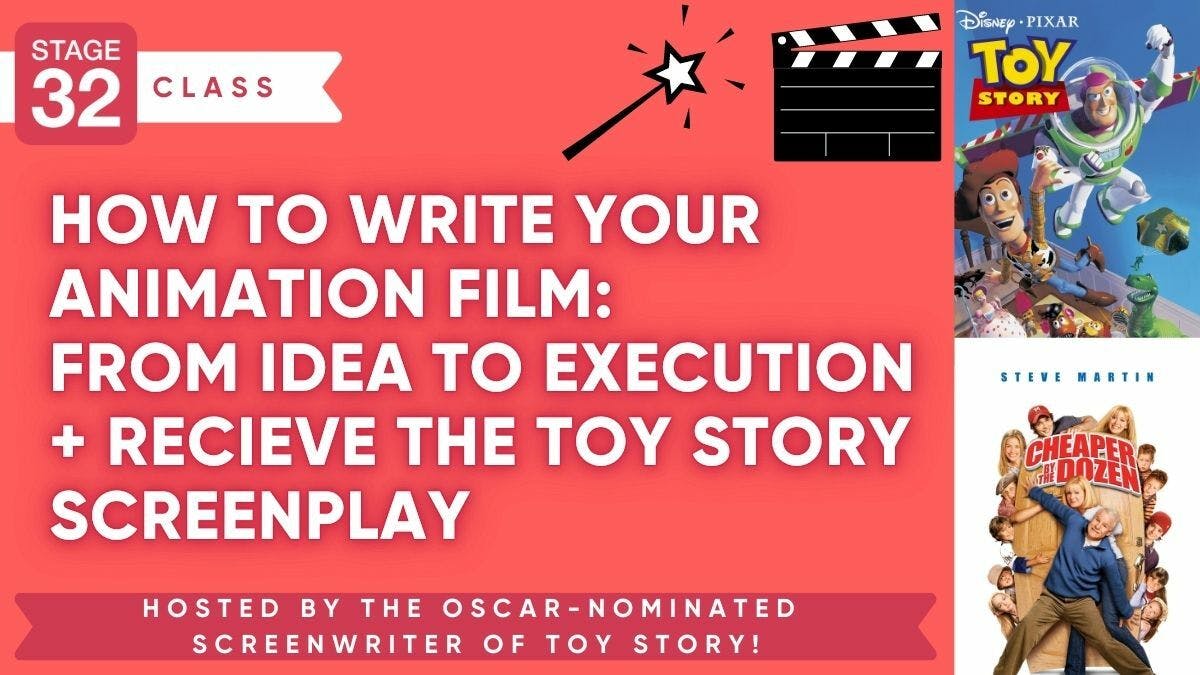
$399.00
ON DEMAND
Taught By: Alec Sokolow
How To Write Your Animation Film: From Idea to Execution + Get The TOY STORY Screenplay
Webinar

Free
ON DEMAND
Taught By: Richard Botto
Ask Me Anything with Stage 32 CEO Richard "RB" Botto: The State of the Industry - Where We are Headed (February 2023)
Webinar

$49.00
ON DEMAND
Taught By: Jeff Fastner
How to Develop & Sell Your Adult Animation TV Series or Film
Webinar

$49.00
ON DEMAND
Taught By: Mike Disa (Educator)
Animation Business 101
Webinar
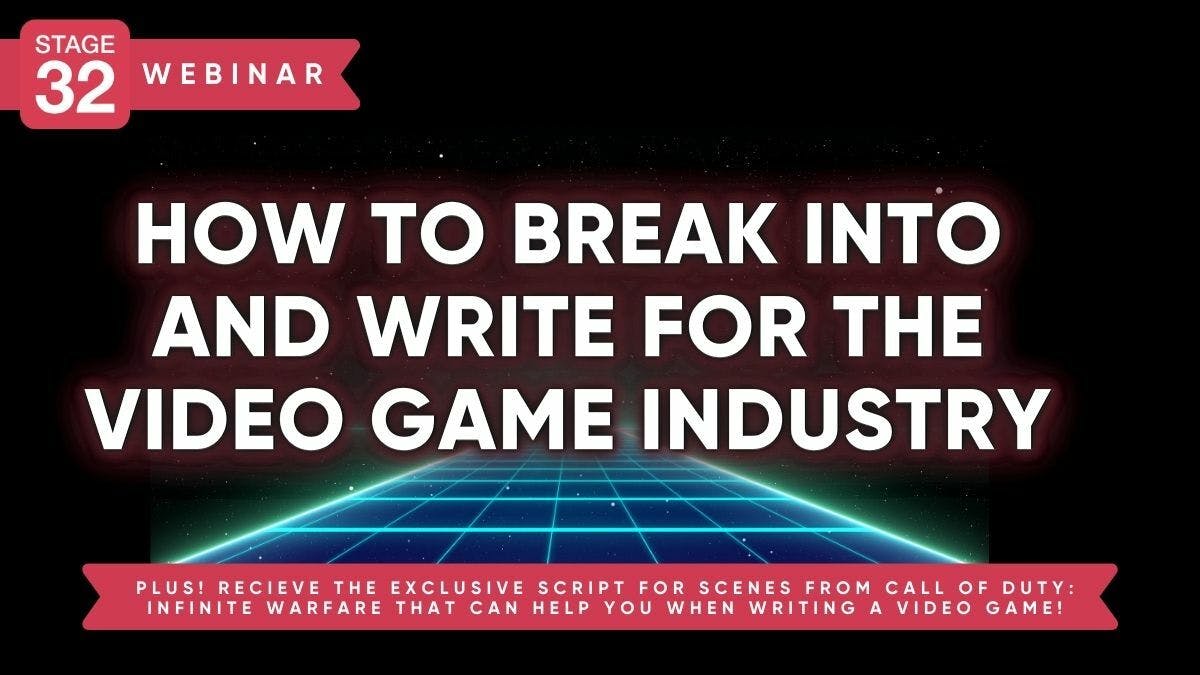
$49.00
ON DEMAND
Taught By: Andrew M Henderson
How To Break Into And Write For The Video Game Industry
Webinar
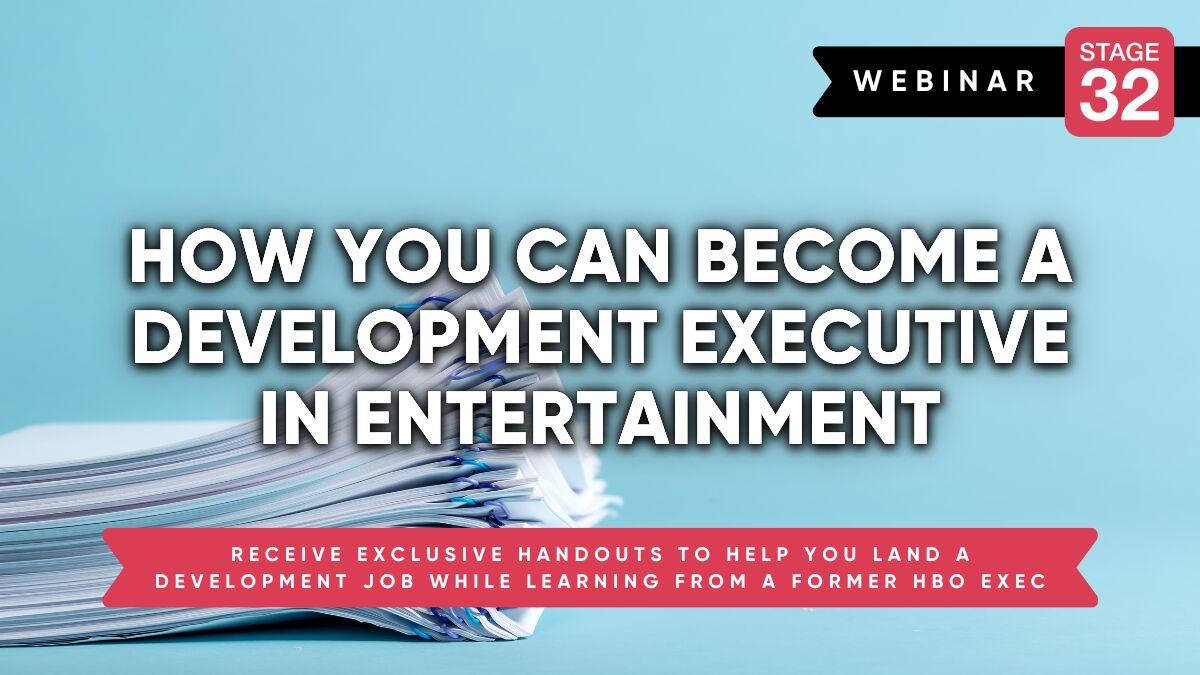
$49.00
ON DEMAND
Taught By: Kelly Edwards
How You Can Become A Development Executive In Entertainment
Class

$299.00
ON DEMAND
Taught By: Spencer Robinson
How to Break Into TV Writing: Get Repped, Get Staffed, Get Sold
Webinar
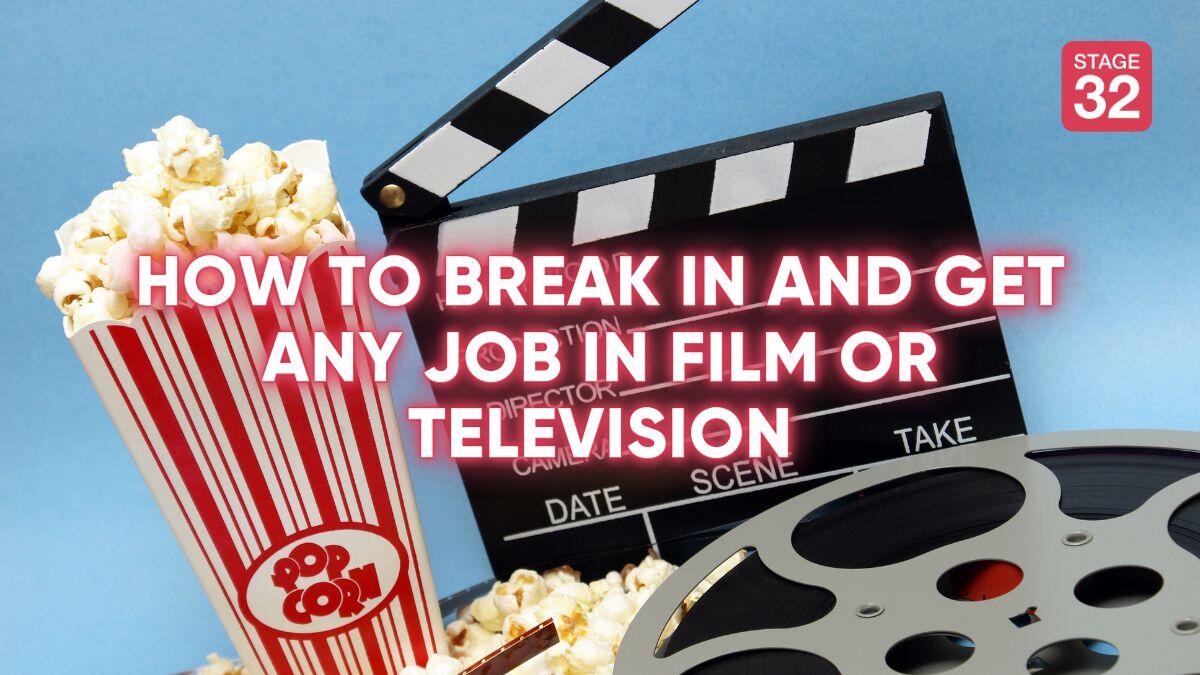
$49.00
ON DEMAND
Taught By: Matt Harry
How to Break in and Get Any Job in Film or Television
Webinar

$49.00
ON DEMAND
Taught By: Kate Sargeant
How to Transition from Acting to Writing by Using the Superpowers You Already Have
Webinar
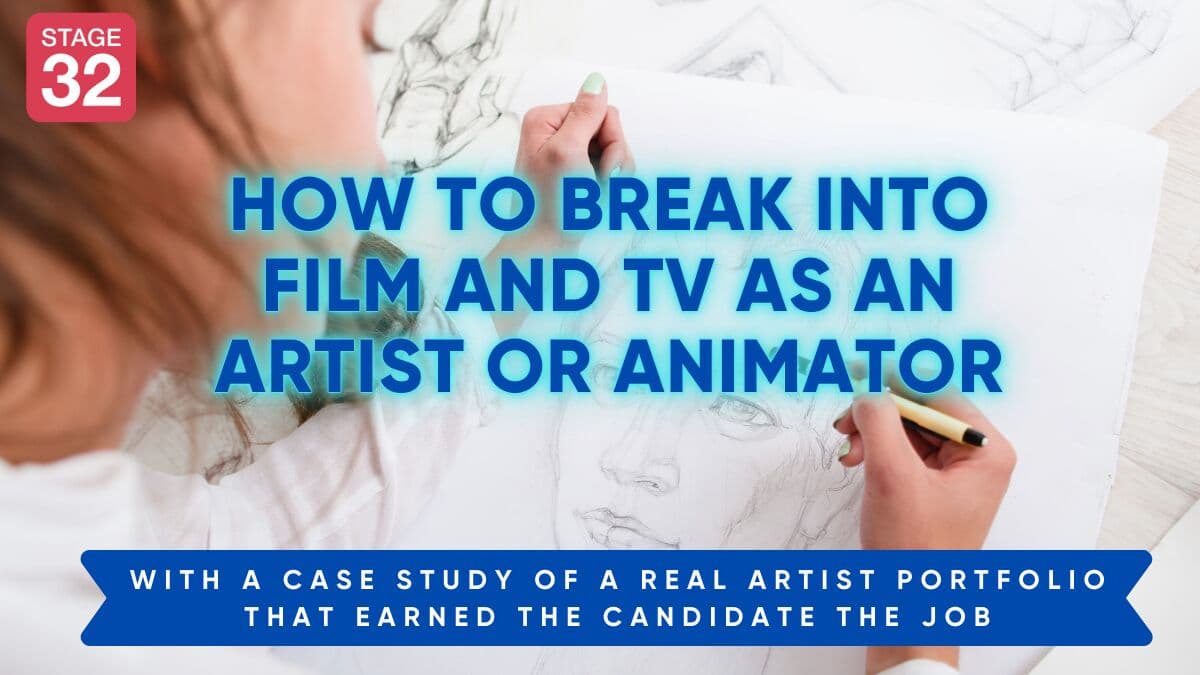
$49.00
ON DEMAND
Taught By: Ariel Goldberg
How to Break into Film and TV as an Artist or Animator- With a Portfolio Case Study
Webinar

$49.00
ON DEMAND
Taught By: Keith Rivers
How to Break in and Make a Living as a Commercial Director
Webinar

$49.00
ON DEMAND
Taught By: Richard Teodorczyk
How to Get Work in the Camera/ Grip/ Electrical Department on a Film or TV Show
Class

$99.00
ON DEMAND
Taught By: Carmen Cabana
2-Part Class: Cinematographers: How to Prepare & What to Expect On Set
Class

$399.00
ON DEMAND
Taught By: Mark Rosman
4-Part Directing Class: How To Master Shot Coverage
Class

$199.00
ON DEMAND
Taught By: Gareth Taylor
How to Choose the Best Camera & Equipment for Your Film
Webinar

$49.00
ON DEMAND
Taught By: Shane Stanley
How To Use 11 Different Camera Angles To Evoke Mood and Emotion
Class

$199.00
ON DEMAND
Taught By: Brenda Wachel
2-Part Class: Advanced Shot Coverage - Implementing Shot Lists and Visual Diversity for Your Film
Webinar

$49.00
ON DEMAND
Taught By: Philippe Deseck
How to Plan and Shoot Action Sequences - Learn From a SAG Award -Nominated Stunt Performer (THE MEG, AQUAMAN)
Webinar
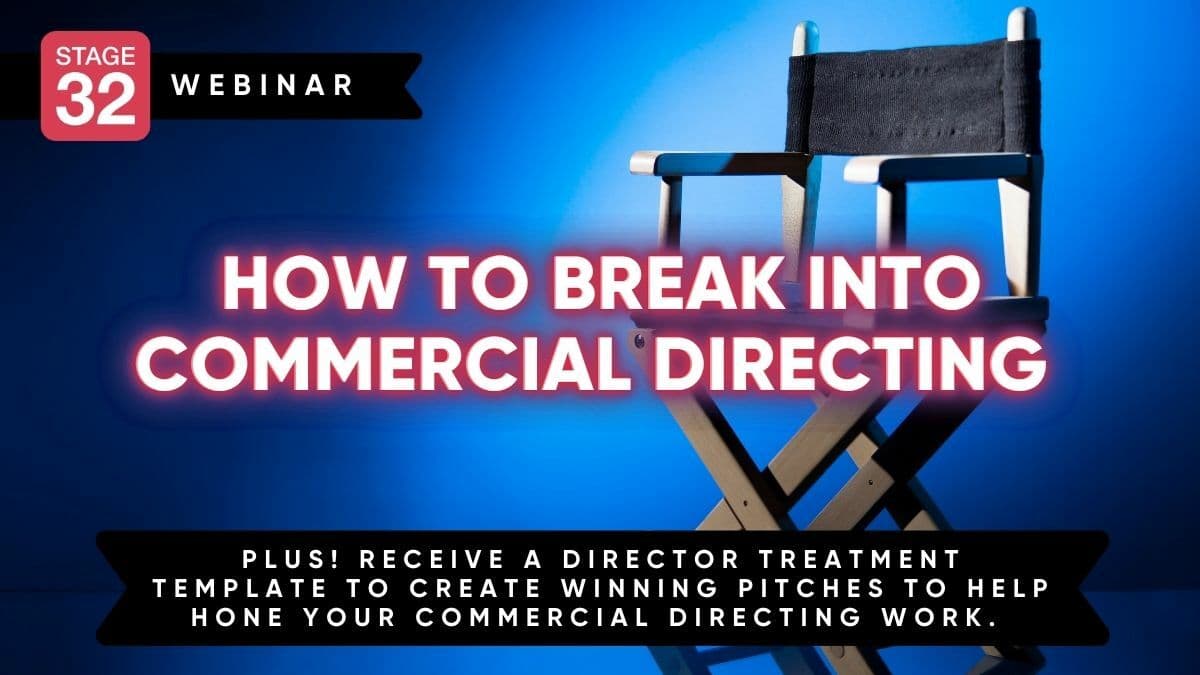
$49.00
ON DEMAND
Taught By: RJ Collins
How To Break Into Commercial Directing
Webinar

Free
ON DEMAND
Taught By: Richard Botto
Ask Me Anything with Stage 32 CEO Richard "RB" Botto: The State of the Industry - Where We are Headed (February 2023)
Webinar

$49.00
ON DEMAND
Taught By: Sefi Carmel
How to License Existing Music For Your Film
Webinar
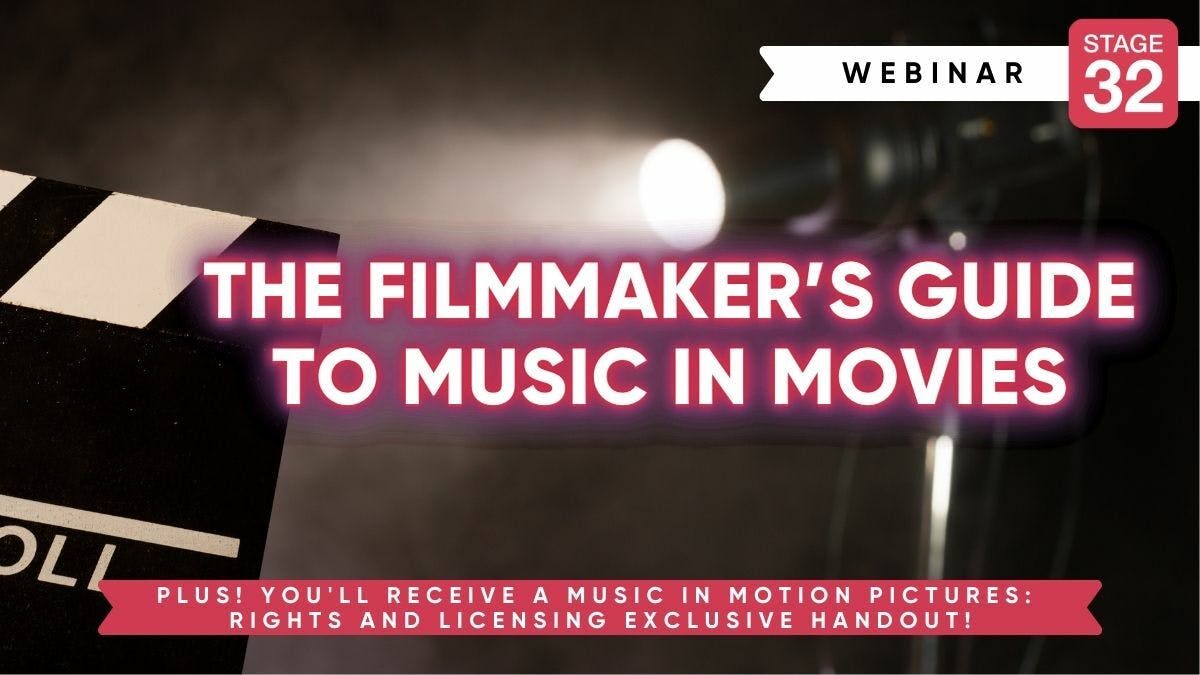
$49.00
ON DEMAND
Taught By: Alan Brewer
The Filmmaker’s Guide To Music In Movies
Webinar

$49.00
ON DEMAND
Taught By: Michèle Vice-Maslin
How To Produce And License Songs For Film And Television
Webinar

Free
ON DEMAND
Taught By: Richard Botto
Ask Me Anything with Stage 32 CEO Richard "RB" Botto: The State of the Industry - Where We are Headed (February 2023)
Webinar
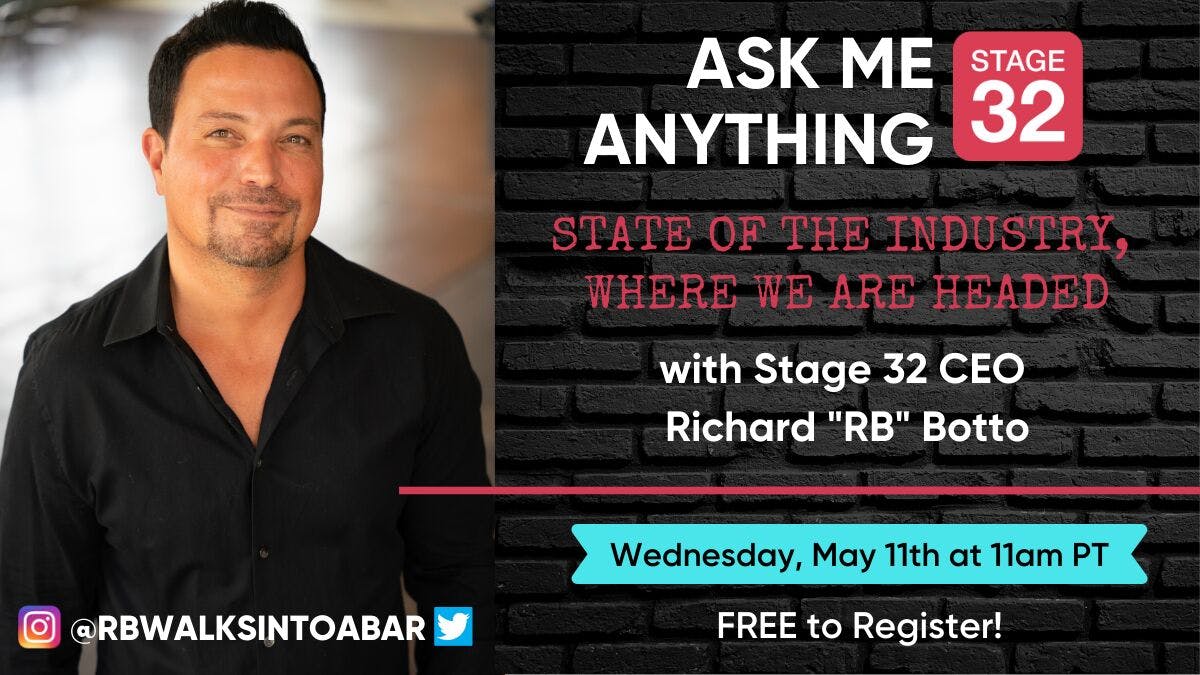
Free
ON DEMAND
Taught By: Richard Botto
Ask Me Anything with Stage 32 CEO Richard "RB" Botto: The State of the Industry - Where We are Headed
Webinar

Free
ON DEMAND
Taught By: Top Female Leaders in Entertainment
International Women's Day 2022: Stage 32 + Female Voices Rock Celebrate Women In Entertainment
Webinar

Free
ON DEMAND
Taught By: Jeanette B. Milio
Netflix + Stage 32 Present: How To Write a TV Series To Budget
Webinar

Free
ON DEMAND
Taught By: Anna Henry
Netflix + Stage 32 Present: Television Pilot Story Structure
Class

$399.00
ON DEMAND
Taught By: Chris Debiec
Stage 32 4-Part Class: A Guide to Shooting Your Film in a Foreign Country - from Pre-Production to Post-Production
Webinar

$49.00
ON DEMAND
Taught By: Chris Debiec
A Producer’s Guide to Hiring and Managing Key Departments
Webinar

$49.00
ON DEMAND
Taught By: Philippe Deseck
How to Plan and Shoot Action Sequences - Learn From a SAG Award -Nominated Stunt Performer (THE MEG, AQUAMAN)
Webinar

$49.00
ON DEMAND
Taught By: Stephen van Vuuren
How To Maximize Post-Production Before You Start Shooting
Webinar

$49.00
ON DEMAND
Taught By: Kenneth Lui
Visual Effects 101
Webinar

$49.00
ON DEMAND
Taught By: Brenda Wachel
The Role Of A Script Supervisor And Why You Need One
Webinar

$49.00
ON DEMAND
Taught By: Ariane Ackerberg
How To Make A World-Class Film Trailer And Use It To Sell or Market Your Movie
Webinar

$49.00
ON DEMAND
Taught By: Peter Sullivan
The Final Cut: Optimizing The Director-Editor Relationship
Class

$399.00
ON DEMAND
Taught By: Mark Rosman
4-Part Directing Class: How To Master Shot Coverage
Webinar

$49.00
ON DEMAND
Taught By: Joshua Young
Introduction to AI for Imagery: Mock-Ups, Trailers, Sizzle Reels, Previs & More!
Webinar

$49.00
ON DEMAND
Taught By: Kate Sharp
Why Your Script Isn’t Getting Traction & How You Can Stand Out in the Market
Class

$399.00
ON DEMAND
Taught By: Brian Herskowitz
Stage 32 4-Part Class: Heroes & Villains: How To Write Protagonists and Antagonists That Leap Off The Page
Class

$399.00
ON DEMAND
Taught By: Jeff Nemon
Stage 32 4-Part Class: How to Sell Your TV Series to a Streamer or Network - From Pitch to Screen
Webinar

$49.00
ON DEMAND
Taught By: Sefi Carmel
Audio Post Production 101
Webinar

$49.00
ON DEMAND
Taught By: Chisom Ude
How to Create an Effective Beat Sheet for Your Film
Class

$399.00
ON DEMAND
Taught By: Zack Ward
Stage 32 4-Part Directing Class: How to Direct an Ultra Low Budget Horror Film
Lab

$699.00
Jun 22nd, 9:00 AM PDT
Taught By: Emma Louise Smith
Stage 32 Finance Lab: Crafting a Financial Investor Prospectus for Your $2-$5MM Feature Film (June 2025)
Class

$399.00
$299.00
Jul 7th, 3:00 PM PDT
Sale ends 6/24
Taught By: Sean Flanagan
4-Part Class: Smart Film Finance - Matching Your Film's Budget to Distribution Opportunities
Webinar

$49.00
ON DEMAND
Taught By: Matt Bierman
How to Develop and Pitch a Romantic Comedy Feature Film
Class

$99.00
ON DEMAND
Taught By: Carmen Cabana
2-Part Class: Cinematographers: How to Prepare & What to Expect On Set
Class

$299.00
ON DEMAND
Taught By: Michelle Alexandria
How to Research and Approach Top Talent to Be in Your Film or TV Series
Class

$399.00
ON DEMAND
Taught By: Erika Arlee & Kristi Ray
Your Production Guide for a Feature Film Under $500K
Class

$399.00
ON DEMAND
Taught By: Mark Rosman
4-Part Directing Class: How To Master Shot Coverage
Webinar

$49.00
ON DEMAND
Taught By: Sefi Carmel
How to License Existing Music For Your Film
Lab

$699.00
Jun 22nd, 9:00 AM PDT
Taught By: Emma Louise Smith
Stage 32 Finance Lab: Crafting a Financial Investor Prospectus for Your $2-$5MM Feature Film (June 2025)
Class

$399.00
$299.00
Jul 7th, 3:00 PM PDT
Sale ends 6/24
Taught By: Sean Flanagan
4-Part Class: Smart Film Finance - Matching Your Film's Budget to Distribution Opportunities
Class

$399.00
ON DEMAND
Taught By: Viviana Zarragoitia
4-Part Class: Private Equity, Debt, Bridge & Gap Financing
Class

$399.00
ON DEMAND
Taught By: Erika Arlee & Kristi Ray
Your Production Guide for a Feature Film Under $500K
Webinar

$49.00
ON DEMAND
Taught By: Emma Louise Smith
Maximize Your Film Funding: International Co-Productions 101
Webinar

$49.00
ON DEMAND
Taught By: Rick Davis
How to Tap into Donor-Advised Funds to Help Finance Your Film
Class

$399.00
ON DEMAND
Taught By: Michelle Alexandria
Stage 32 4-Part Class: How to Produce, Finance, and Distribute Your SAG Ultra-Low Budget Film
Webinar

$49.00
ON DEMAND
Taught By: Erika Arlee & Kristi Ray
How to Make your First Feature Film On a Micro Budget Under $350k
Webinar

$49.00
ON DEMAND
Taught By: Tiffany Boyle
How to Secure the Best Distribution Deal for your Feature Film Project
Class

$399.00
ON DEMAND
Taught By: Sean Pope
Stage 32 4-Part Class: Your Step By Step Feature Film Legal Guide - From Production Formation to Distribution
Webinar

$49.00
ON DEMAND
Taught By: Thomas A. Crowell, Esq.
Legal Guide to Producer and Director Agreements
Webinar
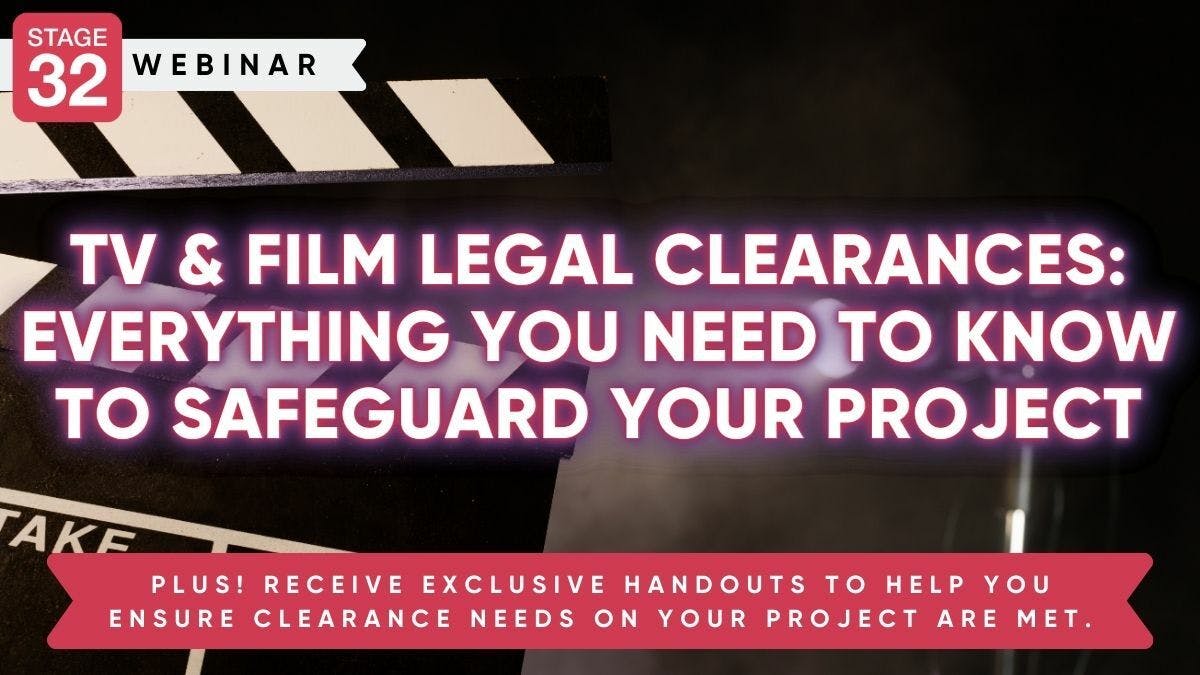
$49.00
ON DEMAND
Taught By: James Pacitti
TV & Film Legal Clearances: Everything You Need To Know To Safeguard Your Project
Webinar
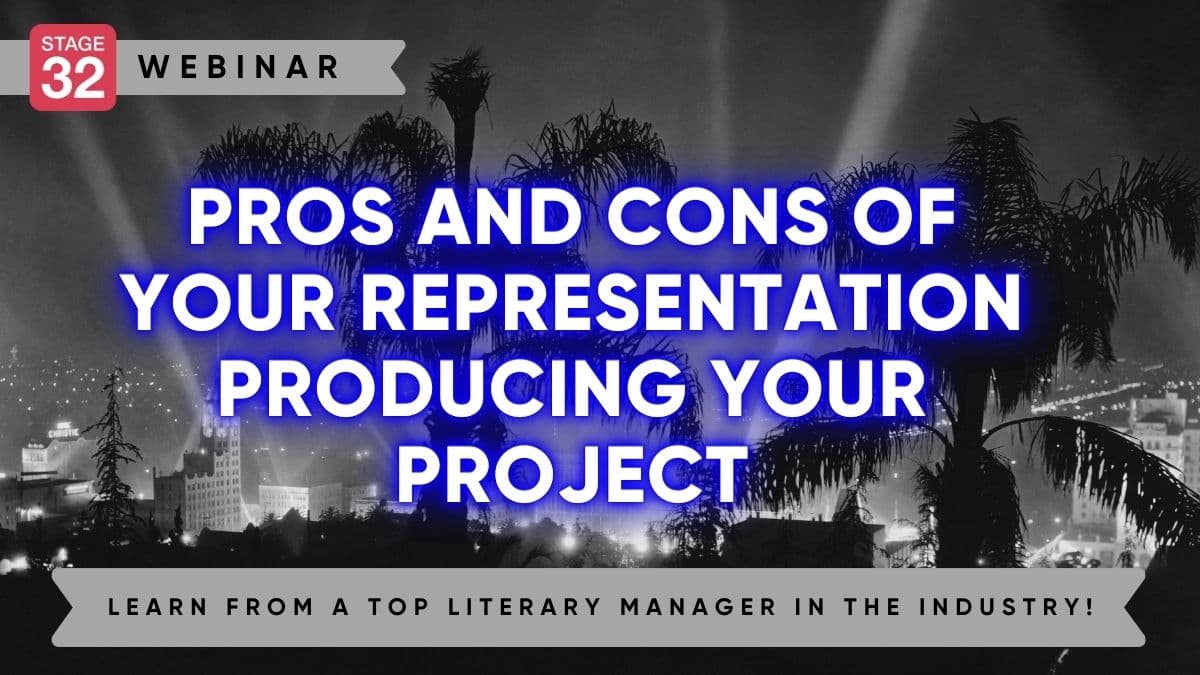
$49.00
ON DEMAND
Taught By: Nicholas Bogner
Pros and Cons of Your Representation Producing Your Project
Webinar
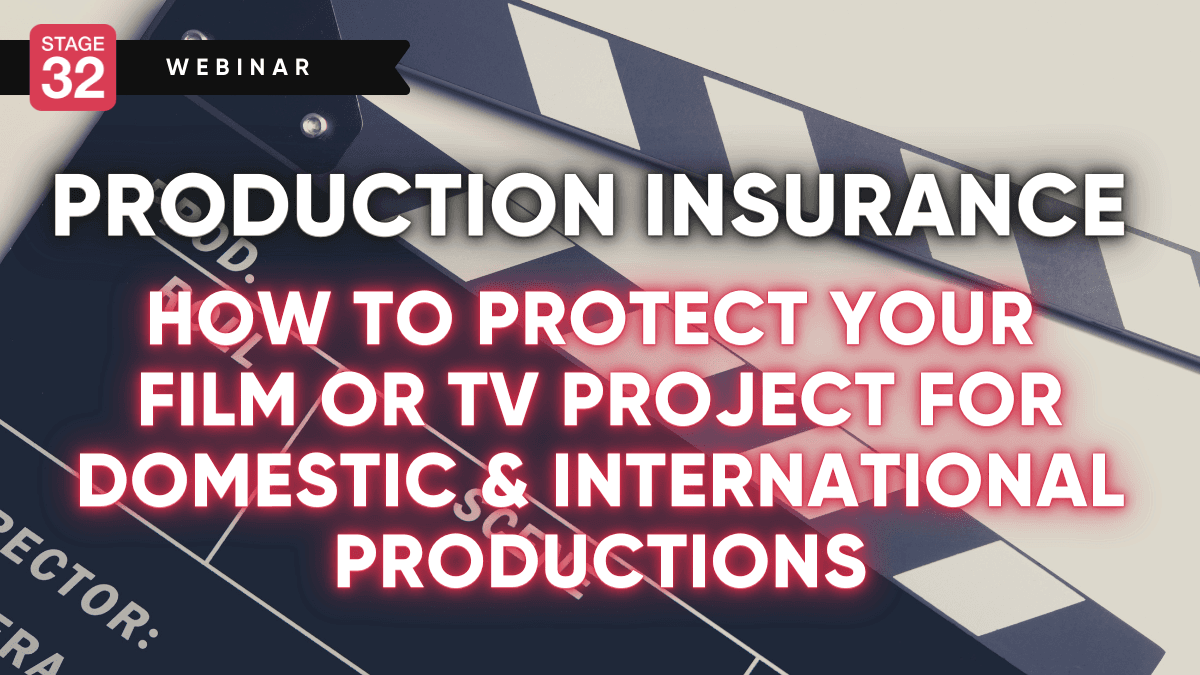
$49.00
ON DEMAND
Taught By: Daniel R'bibo
Production Insurance: How to Protect Your Film or TV Project for Domestic & International Productions
Webinar
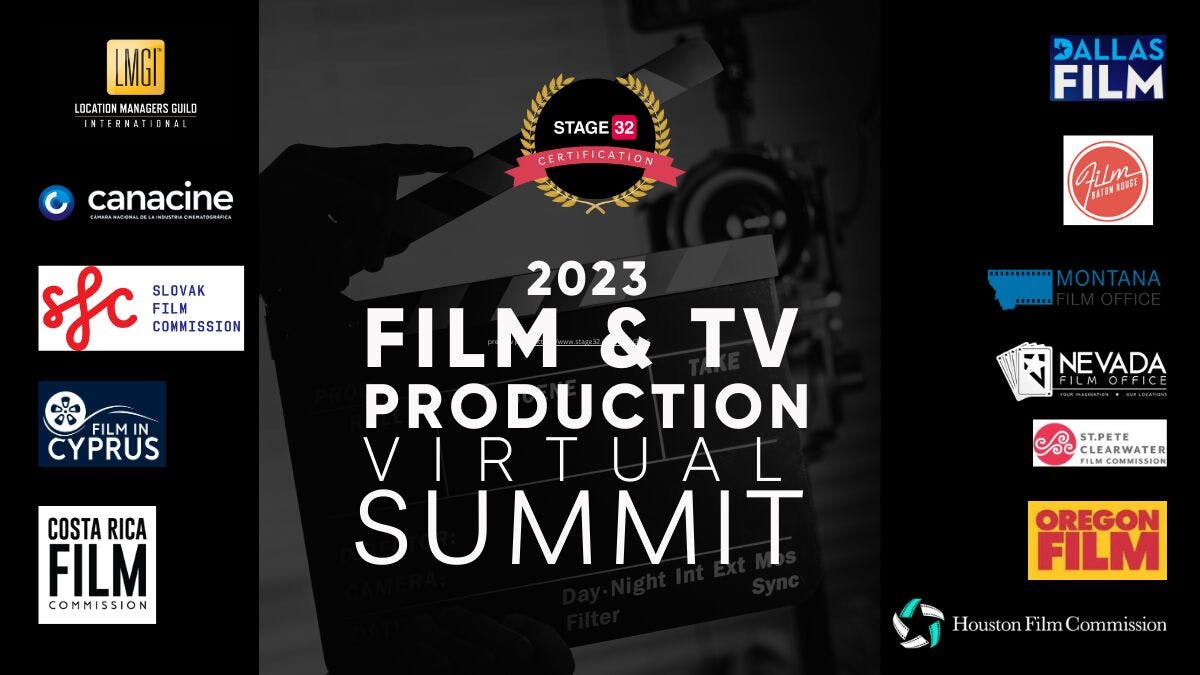
Free
ON DEMAND
Taught By: Top Film & TV Production Professionals
Stage 32 Presents: Global Film & TV Production Summit
Webinar

$49.00
ON DEMAND
Taught By: Thomas A, Crowell, Esq.
Negotiating Strategy 101: How To Set Up And Win Your Negotiations + Downloadable Strategy Cheat Sheet
Webinar
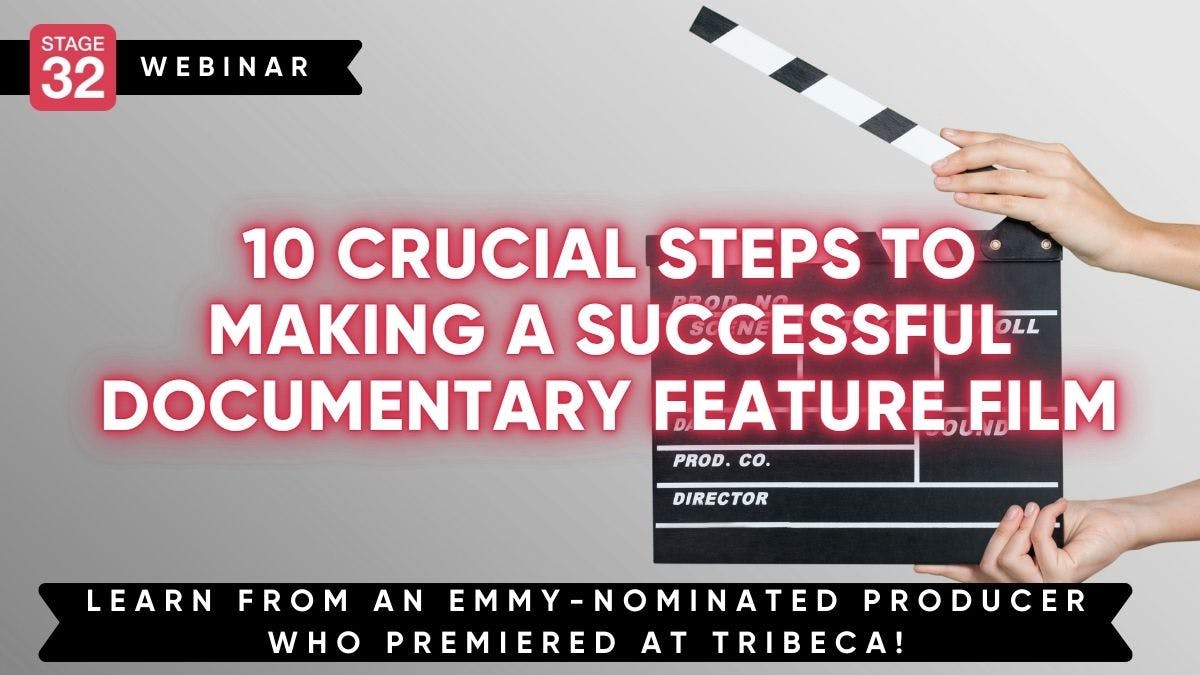
$49.00
ON DEMAND
Taught By: Betsy Schechter
10 Crucial Steps to Making a Successful Documentary Feature Film
Webinar

$49.00
ON DEMAND
Taught By: Nicholas Bogner
How to Use a Short Film as IP for a Feature Film or TV Project
Webinar

$49.00
ON DEMAND
Taught By: Ariane Ackerberg
How To Make A World-Class Film Trailer And Use It To Sell or Market Your Movie
Webinar

$49.00
ON DEMAND
Taught By: Meredith Alloway
How To Maximize The Impact Of Your Short Film: Distribution, PR, Festivals and More.
Class

$399.00
ON DEMAND
Taught By: Ewan Dunbar
Stage 32 4-Part Class: TV Pitch Deck Foundations and Pitching Fundamentals
Webinar

Free
ON DEMAND
Taught By: Richard Botto
Ask Me Anything with Stage 32 CEO Richard "RB" Botto: The State of the Industry - Where We are Headed (February 2023)
Webinar

$49.00
ON DEMAND
Taught By: Deborah Riley Draper
How You Can Partner With Brands To Make Your Documentary
Webinar

$49.00
ON DEMAND
Taught By: Michelle Alexandria
How To Build Your Pitch Deck For Success At AFM & MIPCOM
Webinar

$49.00
ON DEMAND
Taught By: Matt Bierman
How to Develop and Pitch a Romantic Comedy Feature Film
Class

$399.00
ON DEMAND
Taught By: Mark Rosman
4-Part Directing Class: How To Master Shot Coverage
Class

$399.00
ON DEMAND
Taught By: Anna Henry, TV Executive (Educator)
4-Part Stage 32 Class: Level Up Your TV Pitch Bible: Generate Your Story and Map Out Your Seasons
Webinar

$49.00
ON DEMAND
Taught By: Brian Herskowitz
What Do I Cut? How to Approach Your Script Rewrite
Webinar

$49.00
ON DEMAND
Taught By: David Seidler
Masters of Craft: The Oscar Winning Writer of The King’s Speech Teaches the Art and Business of Screenwriting
Webinar

$49.00
ON DEMAND
Taught By: Nick Vallelonga
Masters Of Craft: Deconstructing The Academy Award Winning Script GREENBOOK With Screenwriter Nick Vallelonga
Webinar

$49.00
ON DEMAND
Taught By: Courtney Conte
Masters of Craft: Advanced-Level Television Production
Webinar

$49.00
ON DEMAND
Taught By: Alec Sokolow
Masters of Craft: Writing Feature Films with Oscar Nominated Alec Sokolow (Toy Story)
Class

$299.00
ON DEMAND
Taught By: Michelle Alexandria
How to Research and Approach Top Talent to Be in Your Film or TV Series
Webinar

$49.00
ON DEMAND
Taught By: Jon Sperry
How to Master Regional English Dialects and Reduce Your Accent to Get More Jobs
Webinar
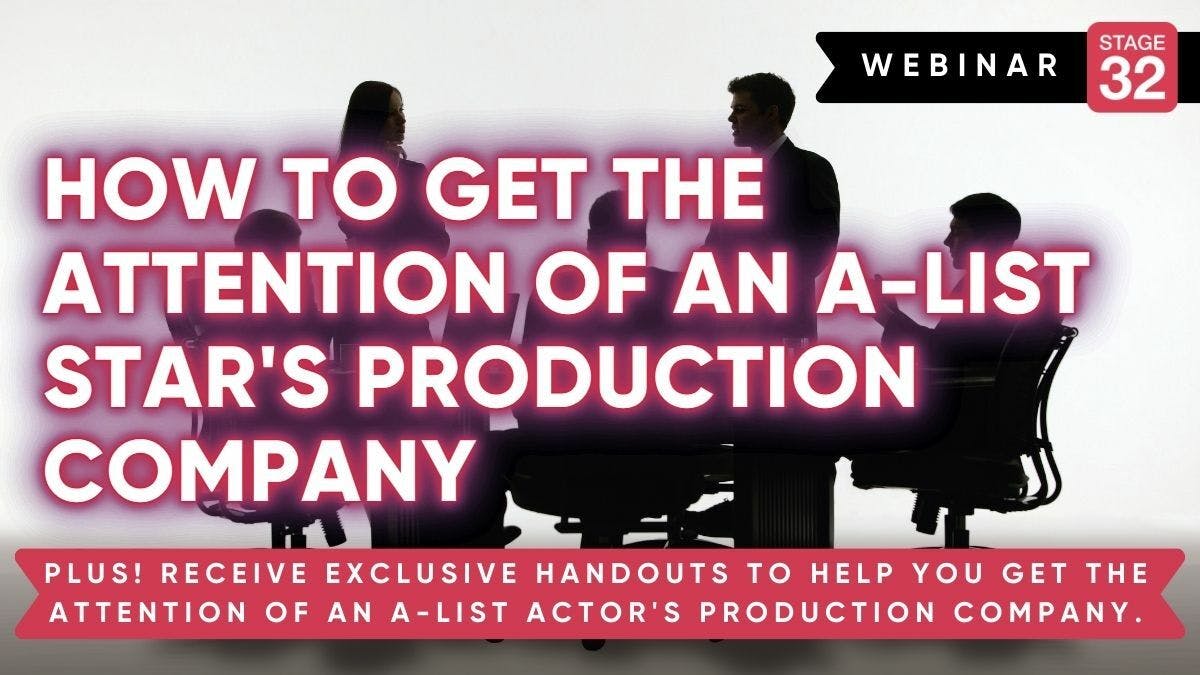
$49.00
ON DEMAND
Taught By: Liliana Granados
How To Get The Attention Of An A-List Star's Production Company
Webinar

$49.00
ON DEMAND
Taught By: Steve Desmond
How To Network Effectively As A Screenwriter
Class
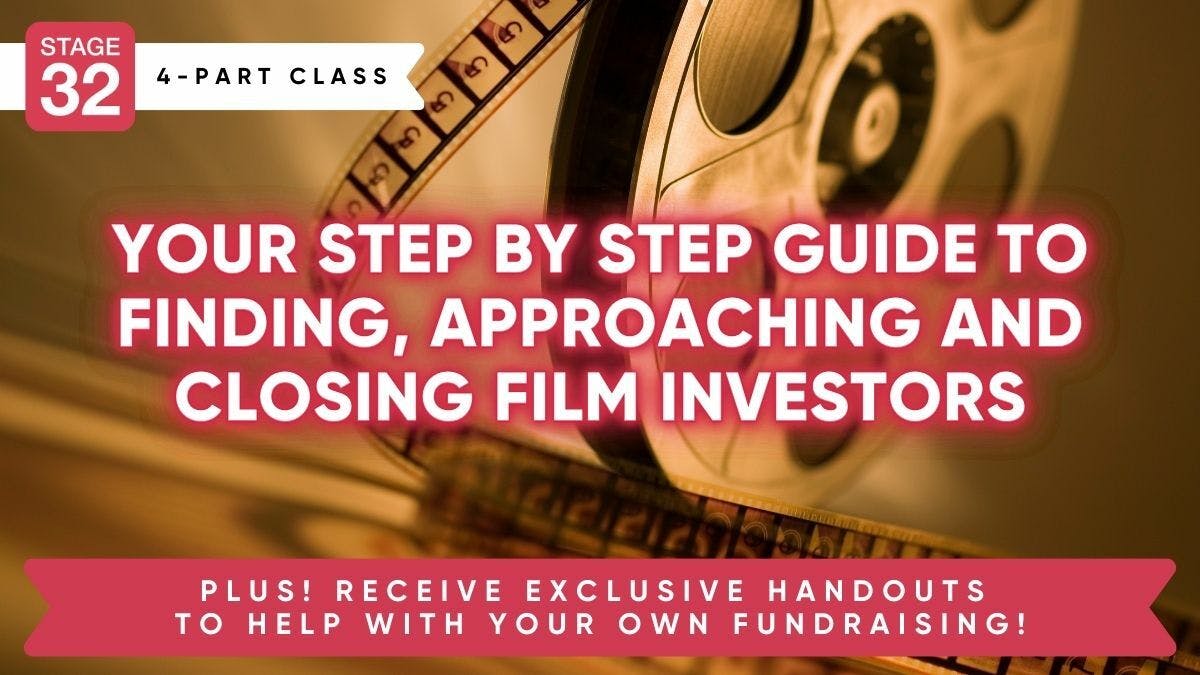
$399.00
ON DEMAND
Taught By: Shane Stanley
Stage 32 4-Part Producing Class: Your Step by Step Guide to Finding, Approaching and Closing Film Investors
Webinar

Free
ON DEMAND
Taught By: Richard Botto
Ask Me Anything with Stage 32 CEO Richard "RB" Botto: The State of the Industry - Where We are Headed (February 2023)
Webinar

$49.00
ON DEMAND
Taught By: Kelly Edwards
How To Build Your Portfolio As A Writer To Get Noticed By Reps + 3 Worksheets
Webinar

Free
ON DEMAND
Taught By: Mickey Fisher
Netflix + Stage 32 Present: How to Write Sci-Fi Scripts for Streaming Television
Class

$299.00
ON DEMAND
Taught By: Michelle Alexandria
How to Research and Approach Top Talent to Be in Your Film or TV Series
Class

$399.00
ON DEMAND
Taught By: Erika Arlee & Kristi Ray
Your Production Guide for a Feature Film Under $500K
Webinar

$49.00
ON DEMAND
Taught By: Emma Louise Smith
Maximize Your Film Funding: International Co-Productions 101
Class

$399.00
ON DEMAND
Taught By: Chris Debiec
Stage 32 4-Part Class: A Guide to Shooting Your Film in a Foreign Country - from Pre-Production to Post-Production
Webinar

$49.00
ON DEMAND
Taught By: Sefi Carmel
Audio Post Production 101
Class

$399.00
ON DEMAND
Taught By: Robin Galloway
Stage 32 4-Part Class: How to Set Up, Structure & Finish Your Second Act (with Writing Exercises)
Class

$199.00
ON DEMAND
Taught By: Gareth Taylor
How to Choose the Best Camera & Equipment for Your Film
Webinar

$49.00
ON DEMAND
Taught By: Chris Debiec
A Producer’s Guide to Hiring and Managing Key Departments
Lab

$699.00
Jun 22nd, 9:00 AM PDT
Taught By: Emma Louise Smith
Stage 32 Finance Lab: Crafting a Financial Investor Prospectus for Your $2-$5MM Feature Film (June 2025)
Class

$399.00
$299.00
Jul 7th, 3:00 PM PDT
Sale ends 6/24
Taught By: Sean Flanagan
4-Part Class: Smart Film Finance - Matching Your Film's Budget to Distribution Opportunities
Class

$399.00
ON DEMAND
Taught By: Erika Arlee & Kristi Ray
Your Production Guide for a Feature Film Under $500K
Class

$399.00
ON DEMAND
Taught By: Michelle Alexandria
Stage 32 4-Part Class: How to Produce, Finance, and Distribute Your SAG Ultra-Low Budget Film
Class

$399.00
ON DEMAND
Taught By: Emma Louise Smith
Stage 32 4-Part Class: Build Your Feature Film Pitch Toolkit: Synopsis, Pitch, Director's Look Book and Business Prospectus
Class

$399.00
ON DEMAND
Taught By: Anna Henry, TV Executive (Educator)
4-Part Stage 32 Class: Level Up Your TV Pitch Bible: Generate Your Story and Map Out Your Seasons
Webinar

$49.00
ON DEMAND
Taught By: Tiffany Boyle
How to Secure the Best Distribution Deal for your Feature Film Project
Class

$399.00
ON DEMAND
Taught By: Shantelle Rochester
Stage 32 4-Part Class: Introduction to Line Producing
Webinar

$49.00
ON DEMAND
Taught By: Matt Bierman
How to Develop and Pitch a Romantic Comedy Feature Film
Class

$399.00
ON DEMAND
Taught By: Eben Davidson
4 Part Producing Class: Introduction to Development Pre-Production & Production
Webinar

$49.00
ON DEMAND
Taught By: Sefi Carmel
How to License Existing Music For Your Film
Webinar

$49.00
ON DEMAND
Taught By: Joshua Young
Introduction to AI for Imagery: Mock-Ups, Trailers, Sizzle Reels, Previs & More!
Webinar

$49.00
ON DEMAND
Taught By: Kate Sharp
Why Your Script Isn’t Getting Traction & How You Can Stand Out in the Market
Class

$399.00
ON DEMAND
Taught By: Michelle Alexandria
Stage 32 4-Part Class: How to Produce, Finance, and Distribute Your SAG Ultra-Low Budget Film
Class

$399.00
ON DEMAND
Taught By: Chris Debiec
Stage 32 4-Part Class: A Guide to Shooting Your Film in a Foreign Country - from Pre-Production to Post-Production
Class

$399.00
ON DEMAND
Taught By: Jeff Nemon
Stage 32 4-Part Class: How to Sell Your TV Series to a Streamer or Network - From Pitch to Screen
Webinar

$49.00
ON DEMAND
Taught By: Nicholas Bogner
Pros and Cons of Your Representation Producing Your Project
Webinar

$49.00
ON DEMAND
Taught By: Jeff Portnoy
How to Write a "Stunt Spec" Script That Opens Doors And Furthers Your Career
Webinar

Free
ON DEMAND
Taught By: Richard Botto
Ask Me Anything with Stage 32 CEO Richard "RB" Botto: The State of the Industry - Where We are Headed (February 2023)
Webinar

$49.00
ON DEMAND
Taught By: Robin Galloway
How You Can Get A TV Literary Manager
Webinar

$49.00
ON DEMAND
Taught By: Kelly Edwards
How To Build Your Portfolio As A Writer To Get Noticed By Reps + 3 Worksheets
Webinar

Free
ON DEMAND
Taught By: Richard Botto
Ask Me Anything with Stage 32 CEO Richard "RB" Botto: The State of the Industry - Where We are Headed
Webinar

Free
ON DEMAND
Taught By: Leila Cohan (Emmy-nominated writer/producer)
Netflix + Stage 32 Present: How to Write Drama Scripts for Streaming Television
Webinar

Free
ON DEMAND
Taught By: Top Female Leaders in Entertainment
International Women's Day 2022: Stage 32 + Female Voices Rock Celebrate Women In Entertainment
Lab

$1199.00
Jun 22nd, 9:00 AM PDT
Taught By: Thomas Pemberton
Stage 32 Screenwriting Lab: Write Your Feature Screenplay in 12 Weeks with Expert Guidance from a Global Executive (June 2025)
Webinar

$49.00
ON DEMAND
Taught By: Chisom Ude
How to Write an Ensemble Cast Feature Film Script
Webinar

$49.00
ON DEMAND
Taught By: Joshua Young
Introduction to AI for Imagery: Mock-Ups, Trailers, Sizzle Reels, Previs & More!
Webinar

$49.00
ON DEMAND
Taught By: Emma Louise Smith
Maximize Your Film Funding: International Co-Productions 101
Class

$399.00
ON DEMAND
Taught By: Brian Herskowitz
Stage 32 4-Part Class: Heroes & Villains: How To Write Protagonists and Antagonists That Leap Off The Page
Webinar

$49.00
ON DEMAND
Taught By: Chisom Ude
How to Create an Effective Beat Sheet for Your Film
Class

$399.00
ON DEMAND
Taught By: Robin Galloway
Stage 32 4-Part Class: How to Set Up, Structure & Finish Your Second Act (with Writing Exercises)
Class

$199.00
ON DEMAND
Taught By: Joshua Young
Stage 32 2-Part Class: How to Use ChatGPT to Help with Your Script Development
Class

$299.00
ON DEMAND
Taught By: Michelle Alexandria
How to Research and Approach Top Talent to Be in Your Film or TV Series
Class

$399.00
ON DEMAND
Taught By: Todd Slavkin
4-Part Class: Sell Your TV Show: How to Bring Value When You Can't Be the Showrunner
Webinar

$49.00
ON DEMAND
Taught By: Joshua Young
Introduction to AI for Imagery: Mock-Ups, Trailers, Sizzle Reels, Previs & More!
Class

$399.00
ON DEMAND
Taught By: Brian Herskowitz
Stage 32 4-Part Class: Heroes & Villains: How To Write Protagonists and Antagonists That Leap Off The Page
Class

$399.00
ON DEMAND
Taught By: Jeff Nemon
Stage 32 4-Part Class: How to Sell Your TV Series to a Streamer or Network - From Pitch to Screen
Webinar

$49.00
ON DEMAND
Taught By: Chisom Ude
How to Create an Effective Beat Sheet for Your Film
Class

$399.00
ON DEMAND
Taught By: Anna Henry, TV Executive (Educator)
4-Part Stage 32 Class: Level Up Your TV Pitch Bible: Generate Your Story and Map Out Your Seasons
Webinar

$49.00
ON DEMAND
Taught By: Mark Rosman
How to Direct TV Movies - Master the Unique Formula and Get More Work
Webinar

$49.00
ON DEMAND
Taught By: Jon Sperry
How to Master Regional English Dialects and Reduce Your Accent to Get More Jobs
Webinar

Free
ON DEMAND
Taught By: Richard Botto
Ask Me Anything with Stage 32 CEO Richard "RB" Botto: The State of the Industry - Where We are Headed
Webinar

Free
ON DEMAND
Taught By: Top Female Leaders in Entertainment
International Women's Day 2022: Stage 32 + Female Voices Rock Celebrate Women In Entertainment
Webinar

$49.00
ON DEMAND
Taught By: Rachel Paulson
10 Tips & Tricks to Booking Work as an Actor
Webinar

$49.00
ON DEMAND
Taught By: Van Gunter
Voice Acting 101: What You Need to Know to Get Started
Webinar

$49.00
ON DEMAND
Taught By: Caroline Slaughter
How to Turn Your Film or TV Idea into a Podcast to Get the Industry's Attention
Webinar

Free
ON DEMAND
Taught By: Peter Goldfinger
Stage 32 Free Workshop: Learn from a Pro How to Pitch Your Project on Zoom - with Pete Goldfinger (SAW Series - SPIRAL, JIGSAW)
Webinar

$49.00
ON DEMAND
Taught By: Rachel Paulson
Actors: Tools and Techniques to Help You Memorize Your Lines
Webinar

$49.00
$39.20
Jun 24th, 1:00 PM PDT
Sale ends 6/19
Taught By: Liliana Granados
Writing with Authenticity: How to Develop a Distinct Voice in Your Script
Webinar

$49.00
$39.20
Jun 26th, 1:00 PM PDT
Sale ends 6/21
Taught By: Pia Chikiamco
How to Pitch an Animated Series to Networks or Streamers
Webinar

$49.00
$39.20
Jun 30th, 1:00 PM PDT
Sale ends 6/25
Taught By: Karina Wilson
How to Write the Perfect Plot Twist: Thriller Screenwriting Essentials
Webinar

Free
ON DEMAND
Taught By: Emma Louise Smith
30 Minutes with Emma Louise Smith
Webinar

$49.00
ON DEMAND
Taught By: Charlie Osowik
How to Pick Comps to Describe Your Script
Webinar

$49.00
ON DEMAND
Taught By: James Kicklighter
What To Do With Your Short Film When You've Exhausted Film Festivals
Webinar

Free
ON DEMAND
Taught By: Michael Wormser (P.G.A. Member) (Educator)
30 Minutes with Producer Michael Wormser
Webinar

$49.00
ON DEMAND
Taught By: Anna Henry, TV Executive (Educator)
Why They Passed: Understanding Industry Feedback